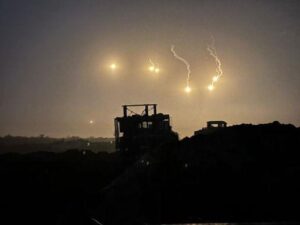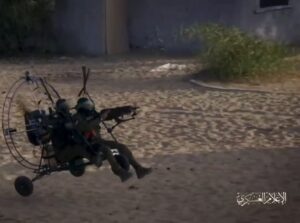Bayard & Holmes
~ Jay Holmes
Many of us in Western nations are wondering why the Israeli government did not act preemptively to prevent the massive attacks by Hamas on October 7, 2023. Complete and accurate answers and lessons learned from this chapter in the Hamas-Israel War will take a few years to fully develop. For the time being, we can safely make some initial observations and postulate some early answers based on what we know thus far in this intelligence perspective on the Hamas attacks. (See Part One for a timeline of the attacks and responses up to December 4.)

Hamas Terrorists Paraglide into Israel
Screen Grab from Hamas Video, Oct 7, 2023
Warnings
Was the Israeli government completely blind to the pending attack? No. We know that is not the case.
On October 9, Egyptian intelligence announced that prior to the October 7 attacks by Hamas, Egypt had given Israel repeated warnings that Hamas intended to conduct a major terrorist attack against it. We know that included a direct phone call from Egypt’s Intelligence Minister to Israeli Prime Minister Benjamin Netanyahu sometime in September.
Iran made repeated loud threats of grand scale attacks against the “Zionist devils” and the “American Great Satan” prior to October 7.
The US Intelligence Community also warned US politicians of “unusual Hamas activity” and a higher than normal threat from Hamas based on multiple sources of intelligence. We know that information from the Israeli government was used in formulating that warning.
Pop Media
The New York Times has published “copies of documents” showing that “Israel knew in detail about Hamas’ attacks over a year in advance.” My use of quotation marks in this paragraph is perhaps too liberal. I am not a masochist, and my time is limited to 24 hours/day so I do not read anything published by the New York Times. I can only paraphrase here.
Some Tik Tokers were convinced that AP and CNN had “admitted to having prior knowledge of Hamas’s October 7 attacks.” Of course, most folks reacted with skepticism to this claim. After all, what are the chances of CNN ever admitting to wrongdoing unless forced to do so in a court of law? The only “evidence” provided by the claimants is that CNN and AP had pictures from the attacks very quickly. We must consider that in 2023, news imagery moves more quickly than it did when Mathew Brady was photographing the US Civil War in the early 1860s, or when the US media was daily misreporting on the US-Vietnam War from 1955 to 1975. Technology changes. Gullibility indexes seem to remain stable.

IDF Soldiers Preparing for Ground Activity in Gaza, Oct. 29, 2023.
Image by IDF Spokesperson’s Unit, public domain
What Took So Long?
Many observers of this chapter of Hamas’s terror activity are also asking why did it take so long for the Israeli government to respond once the attacks started?
This leaves us with general questions of how and why did Israel not act in time to prevent the attack, and specific questions about the nature of Israel’s response. It also leaves us with more specific questions concerning various details of the current battles between Hamas and Israel. There are multiple factors that contributed to Israel’s failure to act in time to prevent Hamas’s October 7 attacks.
Basic Strategic Realities
Israel has a population of 8.9 million people. By comparison, NYC has a population of 8.3 million people. The Israeli Defense Forces normally have 175,000 active duty personnel and 465,000 reserve personnel. Israel has a large military for its overall population, but the majority of that military is in reserve status.

Deployment of IDF on Oct 7
Image IDF Spokesperson’s Unit
Public domain
While Israel’s reservists are expected to respond quickly to a call up, those same reservists occupy important positions across Israel’s economy. When the Israeli government calls up significant members of their military reserve, the primary cost of doing so is not the direct military cost of paying, supplying, transporting and feeding those reservists. That’s the secondary cost. The primary and much greater cost is the loss of those workers from the Israeli economy.
Israel must maintain a strong economy in order to sustain both its well-trained and well-equipped active duty forces and its reserve forces. Any slowdown of the Israeli economy is a hit to Israel and a victory for Israel’s many enemies across the Mideast, Central Asia, and Africa so Israel must be precise in call up decisions in order to support its long term survival. Therefore, Israel must think clearly and cautiously when considering reserve call-ups.

IDF Troops in Gaza Strip
Oct. 31, 2023
Image by IDF Spokesperson’s Unit, public domain
We currently estimate that Israel has called up approximately 330,000 reservists. In the US, a call-up of that many Reservists and Guard members would generate a noticeable difference in defense expenditures and a measurable impact on the US economy. In Israel, the economic impacts are huge.
The cost of having so many reservists activated is one major reason why we have seen a major escalation in the Israeli counter-terror operations in Gaza over the last few days. Hamas knows the clock is ticking, and Israel must make good use of the called-up reservists in a timely fashion. This explains Hamas’s foot dragging with prisoner exchanges. Any cease fire is to Hamas’s advantage.
Factionalism

Secy of State Antony J. Blinken meets with Israeli Prime Minister Benjamin Netanyahu in Tel Aviv on October 12, 2023.
State Department photo by Chuck Kennedy, Public Domain
Here in the US, it would be difficult to envision a government without factional divides. Israel, which has the only democracy in the Middle East, experiences a similar political reality in its relationships with its military.
Prime Minister Benjamin Netanyahu is considered by some members of his government and military leadership to be “too nationalist” or “too right wing.” At the same time, many Israelis consider Netanyahu’s detractors to be “too idealistic” or “too gullible” in dealing with Hamas and other terrorist jihad groups. As a result, this factionalism contributed to Israel not recognizing and coming to a consensus concerning the brewing trouble from Hamas and Hezbollah.
Until leaders agree on what the threat is, they can’t activate an effective response. Israeli political and military leaders have since, for the moment, set aside their differences and are acting with more sense of urgency in dealing with Hamas. How far Israel will go in crushing Hamas remains a matter of debate in Israel.
Experience Impacts Response
Experience effects both how and when senior military leaders and politicians respond to the intelligence information presented to them. Israel receives disturbing intelligence reports concerning Hamas, Hezbollah, Iran, and the Iranian-controlled Houthis in Yemen on an almost daily basis. These reports are usually paralleled by hate-filled pronouncements about the pending destruction of Israel. They predict the normal, daily low-scale provocations by Hamas and other various jihad groups in and surrounding Israel.

IDF Meeting with Chief of the General Staff, LTG Herzi Halevi, Oct. 31, 2023.
Image by IDF Spokesperson’s Unit, public domain
If an Israeli Army general or an Israeli politician went more than two days without such reports from Israeli intelligence services, he or she would be deeply troubled by the eerie silence. They would be quite convinced that Israel’s mortal enemies were hiding something lethal. Warnings of attacks by Hamas and Hezbollah and vitriol from Israel’s enemies are the daily breakfast of every Israeli politician and military officer.
I remember when I would finally beat the snot out of a nasty bully in middle school or high school. As the bully and his useless adoring pals retreated, the bully would usually turn back around for a parting verbal shot. He would, between tears, yell an angry warning that his big brother was going to kill me. The first time this happened, I was cautious and carried a better weapon or two for a while. Eventually, I realized that the little bastard either had no big brother, or his big brother had no more love for the bully than I and my friends did. Over time, I adjusted my defense posture and readiness downward.
Israel has often found itself in an equivalent predicament with Hamas and its Iranian big brother. If Israel reacted strongly to each warning, its economy would eventually collapse.
Even Iron-Age thinkers like Hamas, Hezbollah, and Iran were able to eventually understand this Israeli strategic limitation and use it against them. The Hamas, Hezbollah, and Iranian hysteria broadcasters had the volume turned up high for well over a year leading up to the October 7 attacks. I hate using the word “smart” in the same sentence with “Hamas” or “Iran,” but it was, indeed, a smart change in tactics on their part. This contributed to Israel’s “intelligence failure.”
The System Was Working

Image by IDF Spokesperson’s Unit
Oct. 30, 2023
Public domain
Successful tactics, strategies and systems lead to confidence in those same tactics, strategies, and systems. In the past, Israeli observation posts, along with Israel’s advanced and refined air defense systems, have allowed it to wait for Hamas attacks to materialize before reacting. Over the last decade, Israel has become quite adept at the wait-for-direct-confirmation method of strategic response. Israel uses the constant flow of intelligence to refine its preparedness and positioning of ready active forces and supplies and for executing preemptive air strikes against valuable Hamas targets in Gaza.
When a few dozen or so rockets would come flying out of Gaza, Israeli air defenses were usually able to shoot most of them down. Israel would usually then respond to the limited casualties and property damage sustained with surgical air strikes by fighters or attack helicopters or limited artillery barrages. Until October 7, this system worked well.
Hamas Leveled Up

Screen Grab from Hamas Video of
Oct. 7 Terrorist Attack on Israel
Hamas and its jihadi allies in the West Bank and beyond changed their tactics and strategies. In addition to changes in the pattern of disinformation and propaganda broadcast by Hamas and Hezbollah, those groups changed their ground and missile tactics in both style and scope. Hamas had never before husbanded, by its claim, “5,000 missiles and rockets” (Israel claims it was 2,500), for use in a narrow period of time.
The massive use of rockets and missiles has left Israel’s previously effective air defenses somewhat saturated. In earlier Hamas rocket and missile attacks, the Israeli air defenses, while never perfect, were robust enough to minimize the impact of the attacks. In this instance, the fact that Israel did not predict and significantly prevent the scale of Hamas’s massive rocket and missile attacks magnifies the consequence of any intelligence failures by Israel.
In other changes, Hamas flew over the border with para gliders. It more skillfully breached the fortified the border between Israel and Gaza at multiple locations in larger than usual numbers. It had multiple objectives. As a result, Hamas succeeded in overwhelming the border defenses long enough to inflict casualties and kidnappings on a scale not previously imagined by Israel or Western observers.
This larger scale of attack and new tactics included using drones to attack cell phone towers. Israel had been relying on cell phone communications with its observation towers to receive alerts of any Hamas ground activity along the border. Hamas also used well-trained and well-equipped snipers to attack Israeli personnel in and near the towers. The combination of these two tactics delayed Israel’s initial military reaction to the terrorists’s incursion into Israel. This allowed Hamas terrorists time to systematically murder over 1,400 people and kidnap at least 248 hostages.
Those are, in my opinion, the major factors that led to a failure in Israel’s intelligence systems and the government’s failure to respond to the intelligence that was offered to them.
In our next installment we will consider the likely causes of possible failures in Hamas’s intelligence efforts leading up to their October 7 terrorist attacks.
What’s Happened So Far: Intelligence Perspective on the Israel-Hamas War, Part One
Hamas’s Internal Influences: Intelligence Perspective on the Israel-Hamas War, Part Three
Where Hamas’s Neighbors Stand: Intelligence Perspective on the Israel-Hamas War, Part Four
* * * * * * *
 Bayard & Holmes
Bayard & Holmes
HOLIDAY SALE AND SUBSCRIBER GIVEAWAY!
To celebrate the holidays, we are reducing all digital copies of our books to $3.99 or less. We’re also celebrating you, our readers, with a newsletter subscriber giveaway. One random newsletter subscriber will be chosen on December 21 to receive an official CIA mug and a tin of CIA brand Deep Cover cocoa, along with a signed copy of our Apex Predator novel, The Leopard of Cairo. Subscribe to our infrequent newsletter, the Covert Briefing, by clicking on the button below to be eligible for the giveaway.
Happy Holidays!

Recent Comments